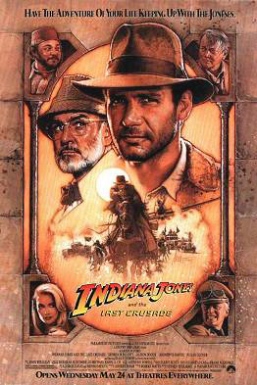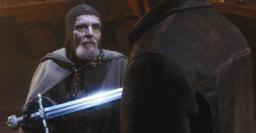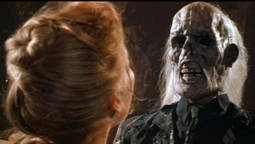Is the Grail a Force For Evil? Understanding Indiana Jones and the Last Crusade

The Holy Grail – purportedly the last cup that Christ drank from, echo of the zombie-making Cauldron of Rebirth – is it actually a force for evil?
Until the 20th century, its main fictional outing was in the King Arthur cycle when its effect on the Round Table is akin to introducing the knights to crack-cocaine: the fellowship scatters, those who achieve the quest – the best knights – go straight to Heaven (read, die), Lancelot gets badly injured, and Britain ends up littered with the graves of knights who would be more useful protecting the realm from the King’s enemies.
Then we come to Indiana Jones and the Last Crusade.
I’m looking at Pulp and Pulp-inspired stores because I’m working on a retro-Space Opera, provisional title “The Eternal Dome of the Unknowable” (Sarah, this is ALL your fault). What better quest story to unpack than this classic Indy adventure?
What I found is rather odd.
Here’s the plot — I’ve added story questions in the form Question Answer But Now…
> Can Indy resist going after the grail? Yes, but his father is in peril so Love impels him to take up the quest. Now he must pick up the Grail trail in order to find his father…
Indy is recently home from his adventures, but gets a summons from Donovan.
Indy doesn’t much like Donovan, but Donovan has a Grail Clue #1. He offers Indy the Grail Guest, but Indy thinks it’s a fool’s errand. However, Donovan reveals Henry (Indy’s father) has gone missing on the same quest.
Meanwhile, mysterious Black Hats have ransacked Indy’s house but missed Henry’s newly arrived DIARY. Diary plus Black Hats indicate great danger, but this means Indy really must tap Donovan’s resources to rescue his father. He accepts the mission.
> Can Indy rescue his father? Yes, but now he must stop the Nazis/Donovan from getting the Grail…
Indy, with Marcus, goes to Venice where Henry vanished. However, hot Doctor Elsa Schneider offers few clues. They go to the abduction site and find Grail Clue #2, but Cultists try to kill them.
Indy defeats the Cultists, but talks to them. They protect the Grail, but he only wants to rescue his father. They tell him that the Nazis have Dr Henry.
Indy could focus on getting his father, but — lured by the Grail quest — foolishly despatches Marcus to Egypt.
In Germany, Indy and Elsa locate Henry, but Elsa — driven by lust for the Grail — double crosses both of them. (Donovan also wants the grail, but has gone in with the Nazis.) Henry had sent Indy the DIARY for safety, but Indy brought it with him! Elsa takes the DIARY but Indy and Henry escape and pursue it to Berlin. Indy takes back the DIARY from Elsa, but cannot bring himself to kill her.
> Can Indy stop the Nazis/Donovan getting the Grail? Yes, but now he must himself resist the Grail…
Indy and Henry reach Egypt, but the Nazis already have Marcus. The Nazis travel in an armoured convoy, but the Cultists shoot it up, so enabling Indy and Henry to rescue Marcus. Indy nearly dies, but Henry wants to go after the Grail.
Indy and friends reach the Grail site, but Donovan captures them. However, Donovan can’t get past the traps. Indy won’t cooperate, but Donovan shoots Henry, forcing Indy to go for the Grail.
Indy gets through the traps and reaches a selection of possible Grails, but Elsa and Donovan follow after and get the drop on him. Donovan wants to drink from the Grail, but Elsa tricks him into drinking the wrong one, killing him. Indy saves Henry with the real Grail, but Elsa tries to leave and sets off an earthquake.
> Can Indy resist the Grail? Yes, but only because Henry has learned to do so. Now Indy will live to fight again…
Fissure sequence: Indy tries to save Elsa, but she reaches for the Grail and falls (KIA). Indy almost topples after her, but Henry arrests his fall. Indy wants to reach for the Grail, but Henry tells him to let it go.
They know the location of the Grail, but choose to turn their back on it and ride off into the sunset.
Phew! There’s a lot of craft in there. Notice how Indy isn’t actually after the Grail from the outset, and how the picture becomes more and more complicated, then resolves to a single short dungeon adventure.

What really stands out is that people are always choosing between the Grail and something else more immediately good. Evil and flawed people choose the Grail. Good and wise people choose otherwise.
For the main characters, the immediately good thing is “love”. Three story questions form the backbone of the emotional story:
- Can Indy resist the pull of the Grail? No, but ultimately the love of his father saves him.
- Can Henry resist the pull of the Grail? No, but ultimately the love for his son saves him.
- Can Elsa’s love for Indy overcome the pull of the Grail? No, and ultimately this is her death.
This also holds true in the backstory: both Donovan and Henry have neglected their wives in order to pursue their quest.

A similar force is in at work in the background. The Grail stops people moving forward in life. Researchers waste their lives on the Grail quest. Donovan could have settled back to enjoy being rich. The Cult has wasted its entire existence, stuck in a holding pattern just to defend the Grail. The Knight of the Grail has spent several hundred years hanging around a cave just getting dusty! No wonder that Henry’s best line is “Let it go!”
The Grail tempts people into bad choices, sucks the life out of both those who quest for it and those who defend it, and ultimately manages to kill almost everybody who does get near it. How is it not a force for evil?
I don’t think this is accidental. Spielberg did something similar with Raiders of the Lost Ark in which the Ark itself is almost certainly the antagonist.
In the Indy-verse, the big religious artefacts are real, but it’s not a good idea to be a bystander while they go about their business.
What do you think Spielberg is really saying?
M Harold Page (www.mharoldpage.com) writes adventure stories in whatever genre he can grab. You can buy his action-packed Dark Age adventure, Shieldwall: Barbarians! (UK, Epub) and also learn how to plan and write your novels using his Storyteller Tools: Outline from vision to finished novel without losing the magic (UK, Epub)
The Grail does save Henry’s life, though, which is a key point: when used as directed, it’s not harmful. Also, your analysis seems to rob people of their agency. Things don’t have agency, but people do. The storytelling power of these artifacts is that, at the climactic points in the plot, they make people answer for the nature of their deeds.
I know this will sound very simple-minded, but I think the Nazis are the antagonists in RAIDERS. Without Indie’s ham-fisted intervention, the Nazis probably would have acquired the actual headpiece of the staff, instead of the imperfect and incomplete version they ended up with. Then Belloq and his crew would have found the Ark under optimal conditions and flown it to Berlin without interference from Indie and Marion. Even if Belloq had tried to pull his little experiment, it would have been under conditions that allowed the Nazis to reclaim the Ark and bury it in _their_ warehouse of occult objects. One can see how this would be a suboptimal result for the God of Abraham, Isaac, and Spielberg.
Interesting analysis. Almost like you’re some kind of professor…
I think the characters *do* have agency in Last Crusade – as per my story questions. Very often, though, the really important agency is about choice. Apart from saving Henry, structurally, the Grail might as well be a Stephen King-style telepathic super spider.
You make a good point about the Lost Ark. However, I think the nuances you describe are too subtle for the movie. I don’t recall anybody calling attention to the sub optimal conditions, though I like the idea of them and the movie might have worked better if they had.
“Ha Dr Jones – you think you have defeated us, but superior Nazi technology allows us to use this bit of Plasticine and an old yogurt pot to complete the ritual. It will, of course, be perfectly safe.”
That said, if the Nazis had stashed the Ark, would not it have eaten all their other artifact?
Not so sure, MHP. Supposing the Mona Lisa had been missing for over a hundred years and a college professor managed to track it down? He’s accompanied by several characters who have their own reasons for wanting the painting, and his rival is an obsessive collector. The good guys just want the painting back where it belongs – in a public gallery. The bad guys either want to sell it, or (in the case of the mc’s rival) keep it in his private sanctum. Nobody would argue that the painting in itself is intrinsically ‘evil’. Just that it’s very existence provokes myriad responses, good and bad, in a variety of different people.
Interesting to see the similarities between the climatic scene in ‘The Last Crusade’ and the final confrontation between Mola Ram and Indie in ‘The Temple of Doom’.
Re the first film (and on the off-chance that nobody has actually seen this before):
https://www.youtube.com/watch?v=oYa26EnN8t0
Ah but then *structurally* the Mona Lisa would also be a giant telepathic spider.
However, the Grail is magical and surrounded by magically generated defenses. It follows that it or its creator have some active responsibility for what happens.
Plus, half the point of the supernatural is to embody metaphorical forces and make them real.
Ah, but a giant, telepathic spider probably has an agenda. An inanimate object (magical or otherwise) will not.
In terms of responsibility, I guess we’re on familiar philosophical ground – why did God create evil? Or if he didn’t create it, why does he allow it to exist?
Not quite, I think. In a fictional universe, everything has an agenda because everything is in the author’s head.